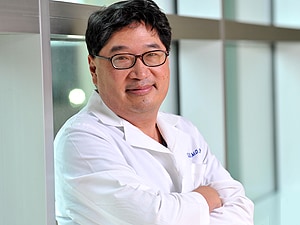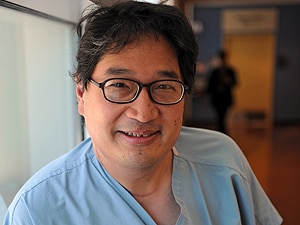August 8, 2012 — University of Chicago chief pediatric surgeon Donald Liu, MD, PhD, saved the lives of 2 children in the rough waters of Lake Michigan August 5 but lost his own life when he drowned after the rescue in southwestern Michigan.
The 50-year-old surgeon, who had gained a reputation for adapting minimally invasive surgical techniques to children, was reportedly pulled underwater by a rip current after entering the lake to help two 12-year-old boys who fell out of a kayak amid high waves. The youths made it safely to shore, according to police in Chikaming Township, Michigan, where Dr. Liu and his family were apparently spending a weekend getaway. Both boys were friends of the Liu family, the
Chicago Tribune reported.
A coworker called Dr. Liu a hero. John Alverdy, MD, professor and vice chairman of surgery at the University of Chicago medical school, said it was no surprise that Dr. Liu would jump into the choppy waters when he saw the boys struggling.
"As a surgeon, he literally grasped children from the brink of death," Dr. Alverdy said. "I'm sure if he were here today, he'd say, 'I was just doing my job. That's why I'm here. I'm not going to watch kids die.' "
The thought perhaps reflects Dr. Liu's own words earlier this year. He was quoted in a "Top Doctors in Chicago" profile in the January issue of
Chicago magazine as saying, "At the end of the day, the biggest impact you can make in anything is through kids."
"Servant of Mankind"
The University of Chicago medical school has lost "one of its most outstanding faculty members," Dr. Alverdy said, calling Dr. Liu a "fantastic surgeon, great educator, and brilliant researcher who was a servant of mankind."
Dr. Liu, who was board certified in both general and pediatric surgery, joined the University of Chicago surgery department in 2001 and became section chief of pediatric surgery and surgeon-in-chief at the university's Comer Children's Hospital in 2007. His medical achievements included performing lifesaving trauma surgery on children and helped redesign laparoscopic surgical instruments for use in children and infants, Dr. Alverdy said.
Another colleague, Daniel Teitelbaum, MD, a professor of surgery at the University of Michigan, Ann Arbor, said, "He made significant contributions to minimally invasive and laparoscopic surgery for infants and children with imperforate anus and gastroesophageal reflux disease, as well as for pediatric cancer." He said he helped train Dr. Liu during his pediatric surgery fellowship at the university's C.S. Mott Children's Hospital from 1995 to 1997 and remained a close associate.
In 2006, Dr. Liu resected a hepatoblastoma in a 2-kg preterm infant using a linear stapler, which also simultaneously minimized bleeding by sealing the liver — a novel approach at the time, according to a University of Chicago press release. In addition, Dr. Liu used minimally invasive surgery to treat pediatric patients with conditions ranging from median arcuate ligament syndrome, pectus excavatum, and gastroschisis to life-threatening abdominal adhesions.
Volunteered in China
Dr. Liu also developed a collaboration between Comer Children's Hospital and the Shanghai Children's Medical Center in China, where he lectured and helped train and mentor junior faculty there. "He was Taiwanese and went yearly to China, to Shanghai, and other hospitals," said Dr. Teitelbaum, who accompanied him on one of those medical trips years ago. "He was quite passionate about that."
His work in China earned him an award from the Shanghai government and an endowed chair at Shanghai Jiao Tong University School of Medicine. He grew up in Taiwan, the son of 2 physicians.
In his research, Dr. Liu studied Hirschsprung's disease, the pathogenesis of necrotizing enterocolitis, and how an infant's dietary intake can alter the intestinal microbiome.
He received his MD and PhD in immunology from Jefferson Medical College at Thomas Jefferson University in Philadelphia, Pennsylvania. He then performed an internship and general surgery residency at the Hospital of the University of Pennsylvania, where he met his wife, Dana Suskind, MD. His widow is also a professor of surgery and pediatrics at the University of Chicago and is the director of the Pediatric Cochlear Implantation Program. Together they have 3 children from 7 to 13 years of age.
Dr. Alverdy said Dr. Suskind is "devastated" by the loss of her husband. The
Chicago Tribune reported that she attempted cardiopulmonary resuscitation on her husband after emergency responders pulled him from the water, but she was unable to revive him.
In a university-prepared statement, Jeffrey Matthews, MD, professor and chairman of surgery at the University of Chicago, said of Dr. Liu: "That he died the way he lived, while saving children, is somehow consistent and heart-wrenching at the same time."




